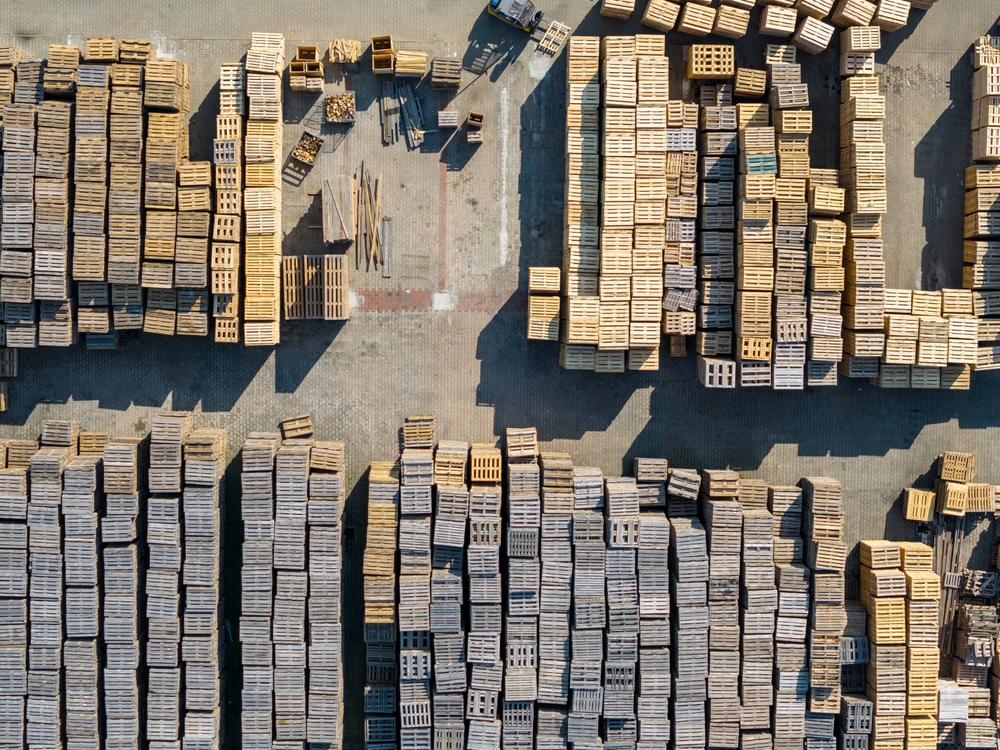Are There Legal Regulations for Using Used Timber Pallets
Used timber pallets are common in many industries. Timber pallets can be reused multiple times. But is there any legal standing that can tell us what is and isn’t allowed?
In this blog, we will answer the question ‘Are there any legal regulations for using used timber pallets?’
A and M Pallets Ltd is an established and respected supplier and producer of a wide array of pallets. Our services are designed to provide many industries with safe, strong and superior pallets of many varieties.
Our solutions are sure to help those in need of pallets for all sorts of logistical needs. We provide full pallet delivery and collection services in Cornwall, Devon, Somerset, Dorset, Wiltshire, and Avon.
How long is the general lifespan of a used timber pallet?
The lifespan of a used timber pallet can vary considerably, as a result of it already having being used. However, the lifespan is influenced by the following factors:
Initial Quality and Construction
The type of wood used in the pallet’s construction significantly impacts its durability. Hardwoods like oak or maple are more resistant to wear and tear than softer woods. Conversely, the way the pallet is constructed, including the jointing methods and the thickness of the boards, affects its strength and stability.
Storage and Handling
Proper storage in a dry, sheltered environment can prevent damage from moisture, pests, and extreme temperatures. Rough handling, dropping, or overloading pallets can accelerate their deterioration.
Usage and Maintenance
Exceeding a pallet’s weight capacity can lead to structural damage. In addition, exposure to rain, snow, and sunlight can accelerate the ageing process. Therefore, routine inspections and repairs can extend a pallet’s lifespan by addressing minor issues before they become major problems.
Treatment and Certification
Pallets treated to meet the International Plant Protection Convention standards are generally more durable and resistant to pests and diseases.
By considering these factors and implementing proper care and maintenance practices, businesses can maximise the lifespan of their used timber pallets. However, it’s important to recognise that even well-maintained pallets have a limited lifespan.
Regular inspections and timely replacements are essential to ensure the safety and efficiency of pallet-based operations. New timber pallets can last between 3-7 years (generally), so finding out the age of the used timber pallet you want to purchase can inform how long it may have left in terms of usage lifespan.
Are there legal regulations for using used timber pallets?

To prevent the spread of pests and diseases, the International Plant Protection Convention (IPPC) has established international standards for wood packaging material (WPM), including pallets. This standard, known as ISPM 15, requires that wood packaging material used in international trade must be treated to meet specific phytosanitary requirements.
UK Regulations:
The UK has adopted and implemented ISPM 15 to ensure that wood packaging material used in both domestic and international trade complies with international standards. This means that used timber pallets must be:
- Heat Treated: This involves heating the wood to a specific temperature to kill pests and their eggs.
- Marked with the IPPC Mark: The IPPC mark indicates that the pallet has been treated to meet ISPM 15 standards.
What happens if you don’t comply?
Failure to comply with ISPM 15 can result in penalties, including:
- Rejection of Shipments: Customs authorities may reject shipments with non-compliant pallets.
- Destruction of Pallets: Non-compliant pallets may be destroyed.
- Financial Penalties: Fines may be imposed for non-compliance.
Therefore, when using used timber pallets, it is essential to ensure they meet ISPM 15 standards. If you are unsure about the treatment status of a pallet, it is advisable to consult with a qualified expert or supplier.
By adhering to these regulations, you can avoid legal issues and ensure the smooth flow of goods in both domestic and international trade.
What makes a pallet illegal?
A pallet can be considered illegal to use in the following situations:
- Non-Compliant with ISPM 15: If a wooden pallet is not treated according to the International Standards for Phytosanitary Measures mentioned before, it cannot be used in international trade. This standard is designed to prevent the spread of pests and diseases.
- Structural Integrity Compromised: A pallet with significant damage, such as broken boards, cracked wood, or compromised structural integrity, is not safe for use. Using such a pallet could lead to accidents, property damage, or injuries.
- Contaminated Pallets: Pallets contaminated with hazardous materials, chemicals, or biological agents are illegal to use. Such contamination can pose serious health and environmental risks.
- Pallets Owned by Pallet Pooling Companies: Many companies, have their own branded pallets that are not intended for personal use. Using these pallets without proper authorisation is considered theft.
It’s important to note that even if a pallet is not technically illegal, using a damaged or unsafe pallet can still be hazardous. Always prioritise safety and ensure that any pallets you use are in good condition and compliant with relevant regulations.
Are there legal regulations for metal pallets?
No, there aren’t specific regulations for metal pallets in the same way as wooden pallets.
The International Standards for Phytosanitary Measures primarily concern wooden packaging materials, as these can harbour pests and diseases that can spread to other countries. Metal pallets, being inorganic, do not pose the same risks.
However, while metal pallets are not subject to the same specific regulations as wooden pallets, they still need to adhere to general safety and quality standards. These standards may vary depending on the specific industry and application, but they typically include:
Structural Integrity
The pallet must be strong enough to support the weight of the load. Otherwise, it can bend the metal, or in some cases, break it. Transporting items on a bent metal pallet can be a serious safety risk, as the balance of the pallet is compromised.
Compatibility
The pallet must be compatible with the relative handling equipment, such as forklifts and pallet jacks.
Safety
The pallet should not pose any safety risks, such as sharp edges or unstable design.
Hygiene
For food and pharmaceutical industries, metal pallets must be cleaned and sanitized to prevent contamination.
In conclusion, while metal pallets don’t have specific international regulations like wooden pallets, they still need to meet industry standards and regulations related to safety, hygiene, and structural integrity.
Buy legally complaint used timber pallets today

As the South West’s largest independent producer and supplier of new and reconditioned pallets, we at A and M Pallets Ltd pride ourselves on providing unrivalled services and the best possible pallets since 1989.
Our hard work, in addition to our loyal and ever-expanding customer base, has allowed us to provide comprehensive coverage through the South West and further afield though our four sites in St. Austell, Tavistock, Launceston and Willand.
Producing over 45,000 pallets a month, you can be sure we will have what you are looking for, whether it is used pallets, new pallets, plastic pallets or ISPM15 heat treated pallets, we are here to help.
In this blog, we hope to have answered the question ‘Are there legal regulations for using used timber pallets? Whilst providing helpful additional information, including our unparalleled services. Our expert team is here to help you on each step of your journey with us, for more information, you can contact us here, or find us below at:
Head Office:
- Unit One Northcott Hamlet
- Launceston
- Cornwall
- PL15 9RQ
- T: 01409 211386
- E: admin@aandmpallets.co.uk
- Mon – Fri: 9am to 5pm
ST. Austell Office:
- Brighton Cross
- Grampound Road
- Truro
- Cornwall
- TR2 4HD
- T: 01726 882122
- E: info@aandmpallets.co.uk
- Mon – Fri: 8am to 5pm
Tavistock Office:
- Haye Down Ind. Est.
- Chillaton
- Tavistock
- Devon
- PL19 0NN
- T: 01822 860456
- E: info@aandmpallets.co.uk
- Mon – Fri: 7am to 5pm
Willand Office:
- 5 Willand Rd Bus. Park
- Willand Road
- Willand
- Devon
- EX15 2RF
- T: 01884 841942
- E: info@aandmpallets.co.uk
- Mon – Fri: 8.30am to 4.30pm
